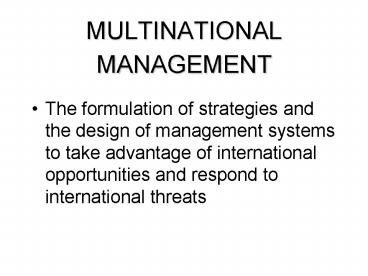MULTINATIONAL MANAGEMENT - PowerPoint PPT Presentation
1 / 24
Title:
MULTINATIONAL MANAGEMENT
Description:
Any company that engages in business functions beyond its domestic borders ... The worldwide trend of businesses expanding beyond their domestic boundaries ... – PowerPoint PPT presentation
Number of Views:44
Avg rating:3.0/5.0
Title: MULTINATIONAL MANAGEMENT
1
MULTINATIONAL MANAGEMENT
- The formulation of strategies and the design of
management systems to take advantage of
international opportunities and respond to
international threats
2
THE MULTINATIONAL COMPANY
- Any company that engages in business functions
beyond its domestic borders - Includes both large and small companies
3
WHY IS MULTINATIONAL MANAGEMENT IMPORTANT?
- Businesses increasingly look to other countries
- To seek global opportunities
- To keep an eye on global competition
4
GLOBALIZATION
- The worldwide trend of businesses expanding
beyond their domestic boundaries
5
SEVEN KEY FORCES ARE GLOBALIZING THE WORLD ECONOMY
- 1. Falling borders
- 2. Growing cross-border trade and investment
- 3. The rise of global products and global
customers - 4. Privatizations
6
- 5. New competitors in the world market
- 6. The rise of global standards of quality and
production - 7. Growing sophistication of information
technology
7
BORDERS ARE FALLING
- Free trade areas and the world trade organization
- In 1996, the number of regional trade agreements
reached 108, almost doubling the number since 1992
8
TRADE AGREEMENTS
- Reduce tariffs and restrictions
- The three largest groups --EU, NAFTA, and APEC
- GATT
- World Trade Organization
9
SELL ANYWHERE, LOCATE ANYWHERE
- World trade growth an average rate of 7 per
year 1990 to 1996 - Nearly half of the over 5 trillion in world
trade is among the European union, the U.S., And
Japan -- the triad
10
FOREIGN DIRECT INVESTMENT (FDI)
- A company from one country has an ownership
position in an organization from another country
- See Ex 1-6 for top 30 - FDI in the developed countries approximately 216
billion
11
(No Transcript)
12
THE RISE OF GLOBAL PRODUCTS AND GLOBAL CUSTOMERS
- The needs of customers growing more similar
- Global customers search the world for their
supplies without regard for national boundaries
13
- Privatization is the sale of government owned
businesses to private investors
14
PRIVATIZATION
- The developing countries and transition economies
use privatization to become capitalistic
economies
15
BENEFITS FOR MULTINATIONAL COMPANIES
- Opportunities for bargain basement investments
- An easy way to gain access
- Often with local government incentives such as
several years of tax free operations
16
A GLOBAL OR REGIONAL PRODUCT STANDARD
- Companies can make one or only a few versions of
a product for the world market - Cheaper than versions for different countries
17
CONSISTENCY IN QUALITY
- The international organization for
standardization (ISO) in Geneva, Switzerland
18
INFORMATION TECHNOLOGY IS MAKES IT ALL EASIER
- Allows easy worldwide communication
- Small companies have more computer power
- Poorer nations can have technology
19
STRATEGY
- The maneuvers or activities that managers use to
sustain and increase organizational performance
20
MULTINATIONAL STRATEGY FORMULATION
- The process of choosing or crafting a strategy
- Challenge of dealing with opportunities and
competitors located anywhere in the world
21
MULTINATIONAL STRATEGY IMPLEMENTATION
- Includes all the activities necessary to achieve
strategic objectives - Requires complex management systems to carry out
the strategies that reach beyond domestic
boundaries
22
THE NEXT GENERATION OF MULTINATIONAL MANAGERS
- A global mindset
- The ability to work with diverse people
- A long range perspective
- The ability to manager change and transition
23
- The ability to create systems for a learning and
changing organizations - The talent to motivate all employees to achieve
excellence - Accomplished negotiation skills
24
- A willingness to seek and succeed in overseas
assignments - An understanding of national cultures





![[PDF]DOWNLOAD Multinational Financial Management PowerPoint PPT Presentation](https://s3.amazonaws.com/images.powershow.com/10087200.th0.jpg?_=20240727043)

























